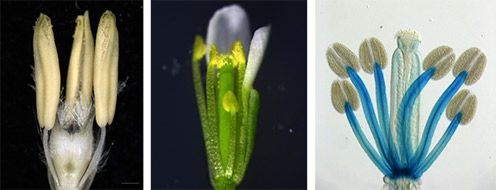DynaMo Mini Symposium: Marcus Geisler & Ivan F. Acosta
We are pleased to invite you to a mini symposium with two exciting speakers:
Markus Geisler, University of Fribourg, Switzerland &
Ivan Acosta, Max Planck Institute for Plant Breeding Research, Cologne, Germany
Markus Geisler
Regulation of auxin transport
 Native auxins are a group of chemically related, mainly indolic compounds, which are ubiquitous key regulators of plant development and performance. Auxin action has been shown to be tightly connected to the presence of local auxin maxima and minima generated by plant-specific cell-to-cell transport. Different families of ABC transporters have been implicated in the transport of native auxins: while members of the ABCB/PGP subfamily are involved in long-range transport of the most abundant auxin, IAA, also IBA (indole-3-butyric acid), is discussed to be transported in a polar fashion by members of the PDR-type ABCG transporter family.
Native auxins are a group of chemically related, mainly indolic compounds, which are ubiquitous key regulators of plant development and performance. Auxin action has been shown to be tightly connected to the presence of local auxin maxima and minima generated by plant-specific cell-to-cell transport. Different families of ABC transporters have been implicated in the transport of native auxins: while members of the ABCB/PGP subfamily are involved in long-range transport of the most abundant auxin, IAA, also IBA (indole-3-butyric acid), is discussed to be transported in a polar fashion by members of the PDR-type ABCG transporter family.
In my talk I will provide evidence that ABCG36/PDR8/PEN3 functions redundantly with closely related isoform ABCG37 in polar IBA transport in roots. Further, we identify the LRR receptor-like kinase, ALK1, as a functional ABCG36 interactor regulating ABCG36 transport activity. In a second part, I will show that auxin-transporting ABCBs are HSP90 clients in plants. We classify HSP90s as root specific, positive regulators of polar auxin transport. The impact of HSP90 inhibition is greatly enhanced in abcb mutants suggesting that HSP90s act as a buffer of auxin transport by stabilizing the plasma membrane presence of redundant ABCB isoforms. In summary, we identify novel modes of ABC transporter-mediated auxin transport regulation by LRR receptor-like kinases and HSP90.
Ivan Acosta
Stamen maturation in barley and in Arabidopsis

Stamen maturation in plants encompasses filament elongation and anther opening, the terminal processes of stamen development that lead to successful self-pollination. The maturation program requires that specific stamen cells undergo expansion, separation or degeneration but the regulation and execution of these cell functions is not fully understood. Therefore, we are using existing male sterile mutant collections in barley to identify and functionally characterize genes important for stamen maturation. The goal is to uncover the proteins, signaling pathways and ultimate mechanisms that regulate and drive cell function in maturing stamens. Additionally, since in several plant species timely stamen maturation is activated by hormones of the jasmonate family, we use Arabidopsis to study the spatiotemporal dynamics of jasmonate signaling components and its function in patterning stamen cell fate decisions.
The speakers

Marcus Geisler
Lecturer
Dept. of Biology (Plant Biology)
University of Fribourg, Switzerland

Ivan Acosta
Group leader
Max Planck Institute for Plant Breeding Research
Cologne, Germany
Acosta lab
